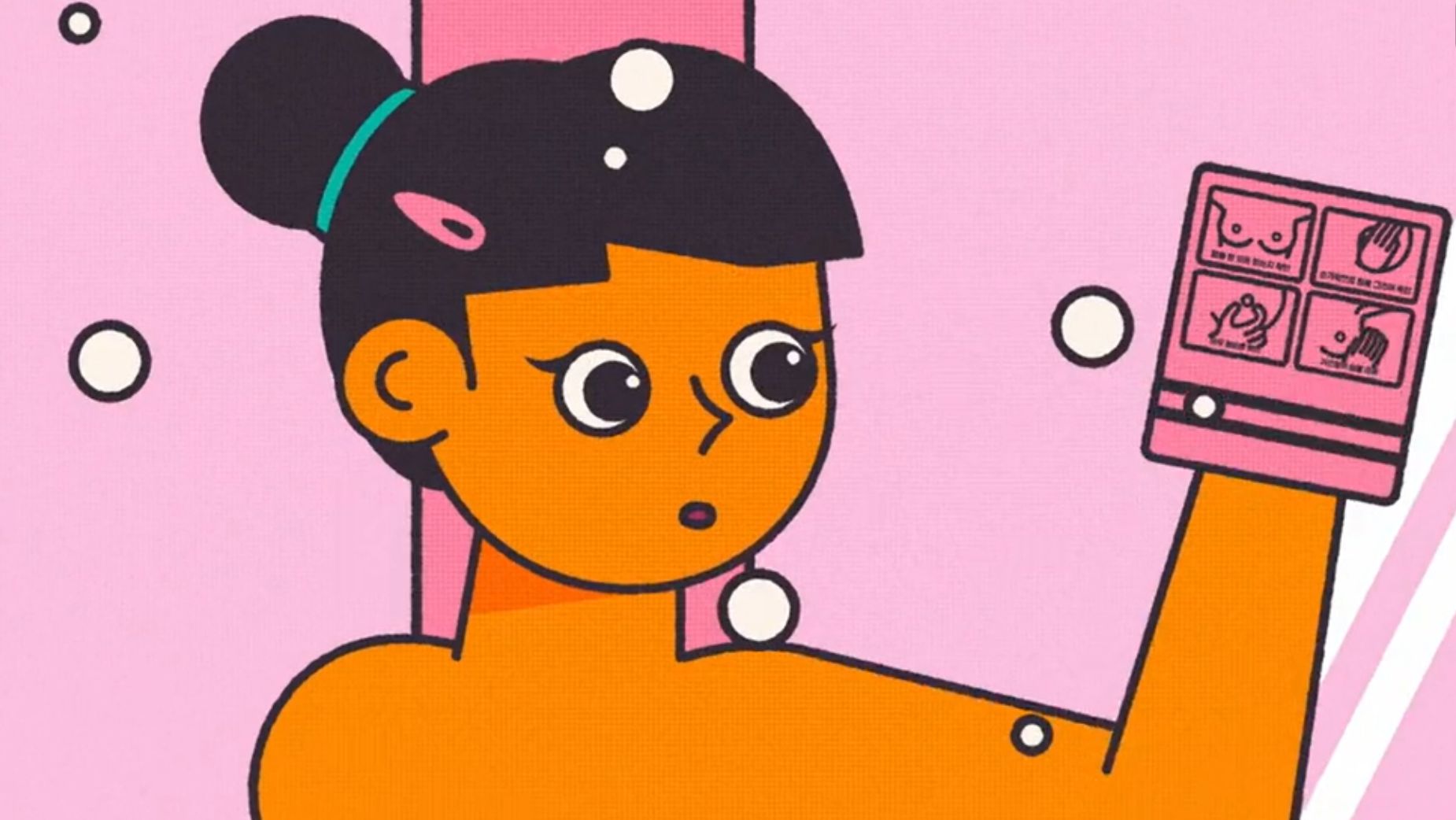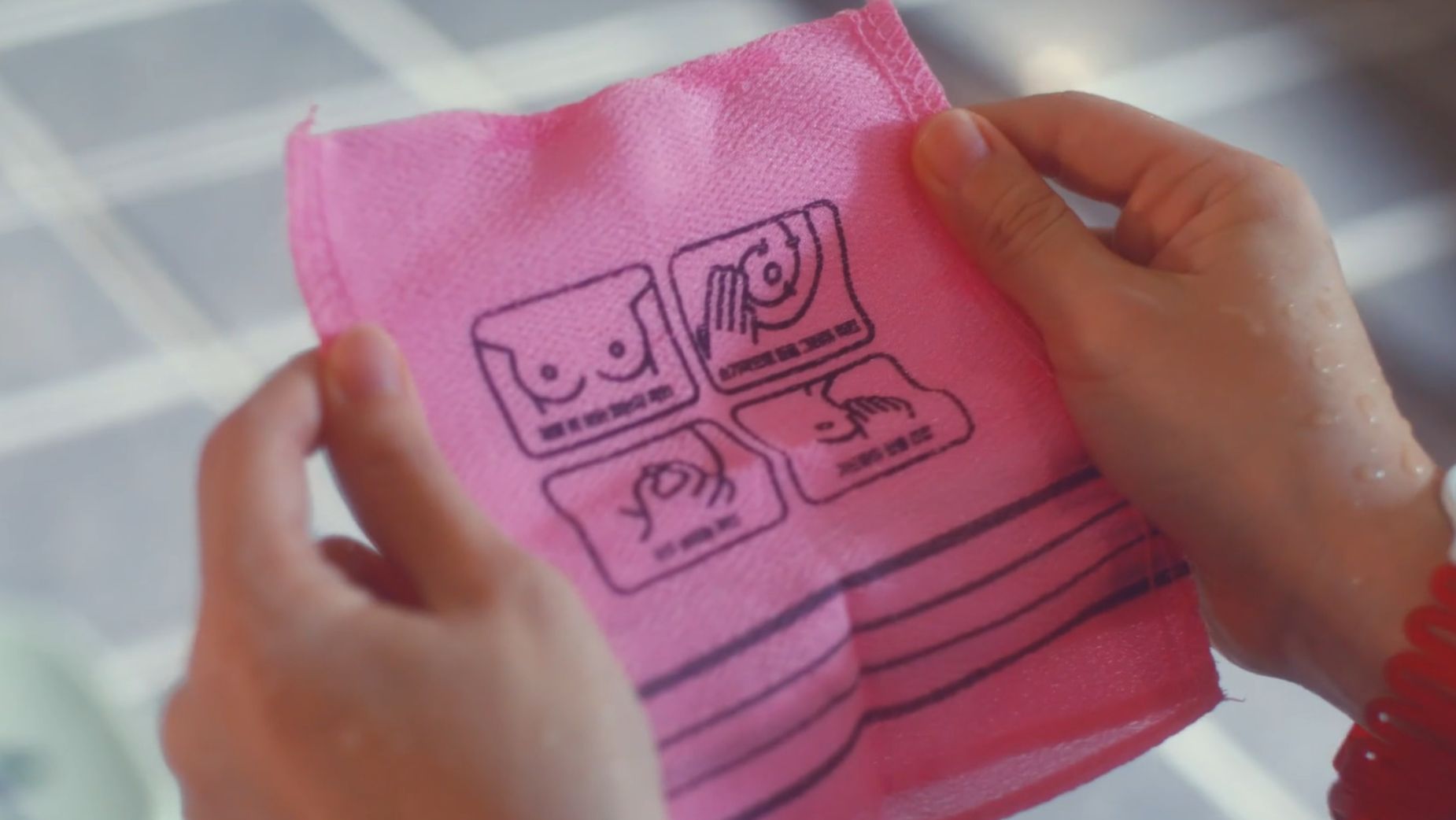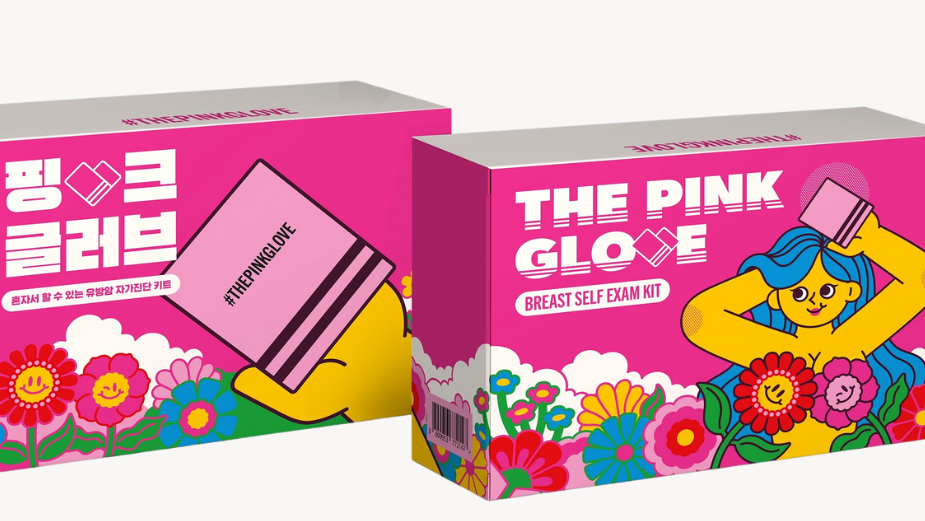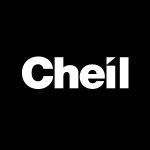
A Brush with Breast Cancer Inspired a Pink Glove That’s Changing Behaviour and Tackling Taboos

Breast cancer is the leading cause of death for women in South Korea, with death rates significantly higher than in neighbouring China and Japan. That’s in part due to taboos that make it hard for women to engage with self-examination, which, in turn, means that they miss early signs.
As Cheil’s global creative director Eugene Park explains, it’s something she’s all too familiar with. Having had her own experience with breast cancer, she noticed that international creative awards were often full of awareness-raising, behaviour-changing campaigns around self-examinations. In stark contrast, Korean brands seemed silent on the topic.
Now, Cheil South Korea and cosmetics brand Kundal are trying to change that with a simple new product that taps into the Korean cultural ritual of visiting the bathhouse. The Kundal Pink Glove is a version of the traditional scrubbing mitt the ‘ttae-soo-geon, only this one is illustrated with a guide to a breast self-exam.
What’s incredible is that this new product sold out in just two days - and Kundal immediately re-upped production. Since its launch last year, the Kundal Pink Glove is part of their permanent product range. And as International Women’s Day nears, it’s as good a reminder as any for women everywhere to check themselves out
LBB> What was the initial brief or conversation that initiated this project?
Eugene> The 'Kundal Pink Glove' campaign was designed to improve breast cancer prevention by encouraging women in Korea, where discussions about women's bodies are still taboo, to perform regular self-examinations. To do this, we took advantage of Korea’s public bathing culture to get women performing breast cancer screenings in a fun and enjoyable way that could become part of their regular bathing ritual. The Kundal Pink Glove campaign was launched on October 19th 2023, World Breast Cancer Day, and Kundal will continue running the campaign to help overcome the taboo for women in Korea.
LBB> How did you get to the idea of tackling Korea's high mortality rates from breast cancer and low levels of self-examination?
Eugene> This is a very personal story, but it was most directly triggered by the results of a medical examination I had eight years ago, and I had seen a lot of public breast cancer campaigns in advertising festivals overseas, but in Korea it is still not taken seriously, or the marketing efforts are limited to showing models walking down glamorous runways or just re-selling pink products. I also noticed that many young women around me didn't even know that self-examination was a thing. As someone who works in advertising, I've always wanted to use my talents in a socially responsible way, and I found inspiration in the intersection of my personal experiences and the conservative sentiment in Korea.
LBB> And why is this brand so well-placed to tackle that issue?
Eugene> Kundal is a representative cosmetics brand that has recently been on the upward trajectory in terms of awareness and sales, and it is a brand that the general public can encounter in various places without any objection. In addition, most of its products are sold online, and the target audience for online purchases is mostly the MZ generation [a mashup of millennial and gen z - a popular shorthand in Korea], so it was in line with the main target audience I had in mind. I think it was the best brand to collaborate with because it has been actively engaged in ESG campaigns before this. I also think that the marketing team is composed entirely of women, so they had a good understanding and empathy for the project.

LBB> What was your starting point for generating ideas and how did you get to the idea of connecting with Korea's bathhouse culture?
Eugene> The idea came from the perspective of being one of the most Korean women and wanting to solve a problem. As you know, Koreans are widely recognised in the world for their external beauty, thanks to a lot of K-pop, beauty, and various content. But behind that is the stigma of breast cancer, which is the number one cancer among women in Korea. In fact, breast cancer campaigns have been passive, perhaps due to the deeply entrenched conservative Confucian culture where even the word 'breast' is shunned. We needed a place to address that, and we found it in the century-old Korean bathing culture, where [people are] undressing, scrubbing, and the iconic tool of the day is the ‘ttae-soo-geon’ (The scrub glove).
Many Koreans carry a lot of these around with them, not only in the bath, but also in the shower at the pool - one per household is not an exaggeration at all - and we thought that this culture of regular bathing, where everyone has one, regardless of age, could be used as an effective tool for breast cancer self-examination.
LBB> For our international readers, can you give us some context and an idea how integral that bath culture and the ttae-soo-geon is to Korean culture?
Eugene> As mentioned earlier, Korean bathing culture is an important factor in understanding this campaign. Speaking of Korean bathing culture, there is an iconic tool called the ‘ttae-soo-geon’. Many Koreans carry a lot of these towels with them not only in the bath, but also in the shower at the pool. One towel per household is not an exaggeration at all. We thought that this culture of regular bathing, where everyone has one, regardless of age, could be used as an effective tool for breast cancer self-examination.
LBB> The case study shows that there is a lot of embarrassment and taboo around conversations about women's bodies. I guess that means that you have to take those sensitivities into account when developing the communications and visual design around the project and the product so that you don't put off the very people you are trying to reach. How did that inform the communications and design approach?
Eugene> I'm glad you asked this question because we didn't have enough time to discuss it in the case study. As you say, design was one of the most important elements of this campaign. Previous domestic breast cancer campaigns have always been communicated in a serious or pink ribbon kind of way, so it's never really been about standing out or wanting to buy it or wanting to own it. Rather, I thought that if I wore a pink ribbon, I would not look like someone related to breast cancer. To solve that problem, we considered the following points. Our main target audience was the MZ generation and we thought they would need an image that they could post on social media. Also, it was going to be distributed through entries and later offline, so considering that, we thought it shouldn't be embarrassing, but it still needed to convey what it was saying.
For this, we collaborated with an illustrator who is loved by our main target audience, and the characters on the packaging are also designed in such a way that no one can guess their specific age. The iconic colour of the ‘ttae-soo-geon’ is also pink, so I think the use of pink throughout the campaign made it easier for people to engage with the campaign and distribute it. Kundal also liked the image so much that they said they would definitely keep the design for future commercialisation. Another little secret is that the team that worked on this campaign was made up of mostly women, including myself, the art director, director, assistant director and illustrator. I think this also contributed to the final design.

LBB> When you launched the kit, it sold out in two days - how did you get the word out?
Eugene> As mentioned earlier, Kundal has been cementing its status as a very popular cosmetics brand in recent times. We also chose to distribute online as most of the purchases are made online, but the response was so much better than expected that the first batch was sold out in a day. Since no one expected such a response, we later secured additional quantities and distributed a second batch, which also sold out, to be precise, in 19 hours. This response was unexpected even by our client, Kundal, and perhaps it is because of this response that Kundal was able to expand The Pink Glove campaign into a sustainable campaign and promise one Pink Glove for every woman in Korea.
LBB> I see in the case study, Kundal received a lot of interest and requests from bathhouses - how did you work with those bathhouses?
Eugene> While Korea's unique bathing culture is nearly 100 years old, it's also a unique market, which is something I've learnt through this campaign: there are dozens of bathhouses in every city in Korea, but most of them are privately run, so it's a market that's not keen on opening everything up to the public to showcase their facilities or hold events. So the only solution we had was to get contacts with the largest bathhouses in the country and reach out to them all, both account and creative teams. Fortunately, we were able to expand our campaign thanks to the cooperation of the franchised large saunas as well as several baths in each city.
One middle-aged woman we met during the campaign told us that she too had detected breast cancer through self-examination and was able to recover from surgery, and thanked us for running this campaign, which was a very touching moment. After the campaign ended, we even had requests to participate from baths that found out about the campaign later. If we have the opportunity to run a second campaign this year, we expect the number of participating saunas to be much higher this time.
LBB> The Pink Glove is now part of Kundal's permanent product range - I guess the ambition is to make the breast exam part of women's weekly routine as a visit to the bath house. What plans do you have to keep the momentum up?
Eugene> While this is something we will be working closely with Kundal on, we had the opportunity to briefly discuss it with them earlier this year during an interview with a Korean business magazine. Kundal is a brand that has run many ESG campaigns in the past, and they have promised us that The Pink Glove will not be a one-off campaign, but a permanent product that will last until the day when every woman in Korea has one. To this end, I believe that we will soon be able to sell the glove online as well as in various offline stores.
LBB> How has this campaign created a platform for conversations around breast exams and breast cancer in the media?
Eugene> First of all, I received a lot of support from my female friends and male colleagues through this campaign, and regardless of gender, there were quite a few people who became aware of the importance of breast cancer self-examination through this campaign.
As I mentioned earlier, there is a long-standing Korean sentiment, so the response may not be immediately different, but I think it was an opportunity to see that even in a culture where it is taboo to talk about women's bodies and health, it is possible to engage people and elicit a response depending on how you address the issue.
LBB> From a personal perspective, what's been the most rewarding or memorable moment bringing this project to life?
Eugene> Needless to say, I'll never forget the first day, firstly because we had to fight a lot of prejudice to get this idea off the ground, and then the actual offline distribution, and then the moment I witnessed two twin girls with their mum looking at The Pink Glove package and listening to their mum explain what it was all about. As a mum of a girl myself and a breast cancer survivor myself, I felt this idea was really helping the world - I was literally busy wiping away tears.
It was also a project with a very tight budget and a tight timeline, but I think it was a project that could only have been completed with the active support of many people who heard the purpose of the project. I would like to thank everyone who helped make this campaign come to life, and Kundal for extending the life of The Pink Glove with merchandising.













